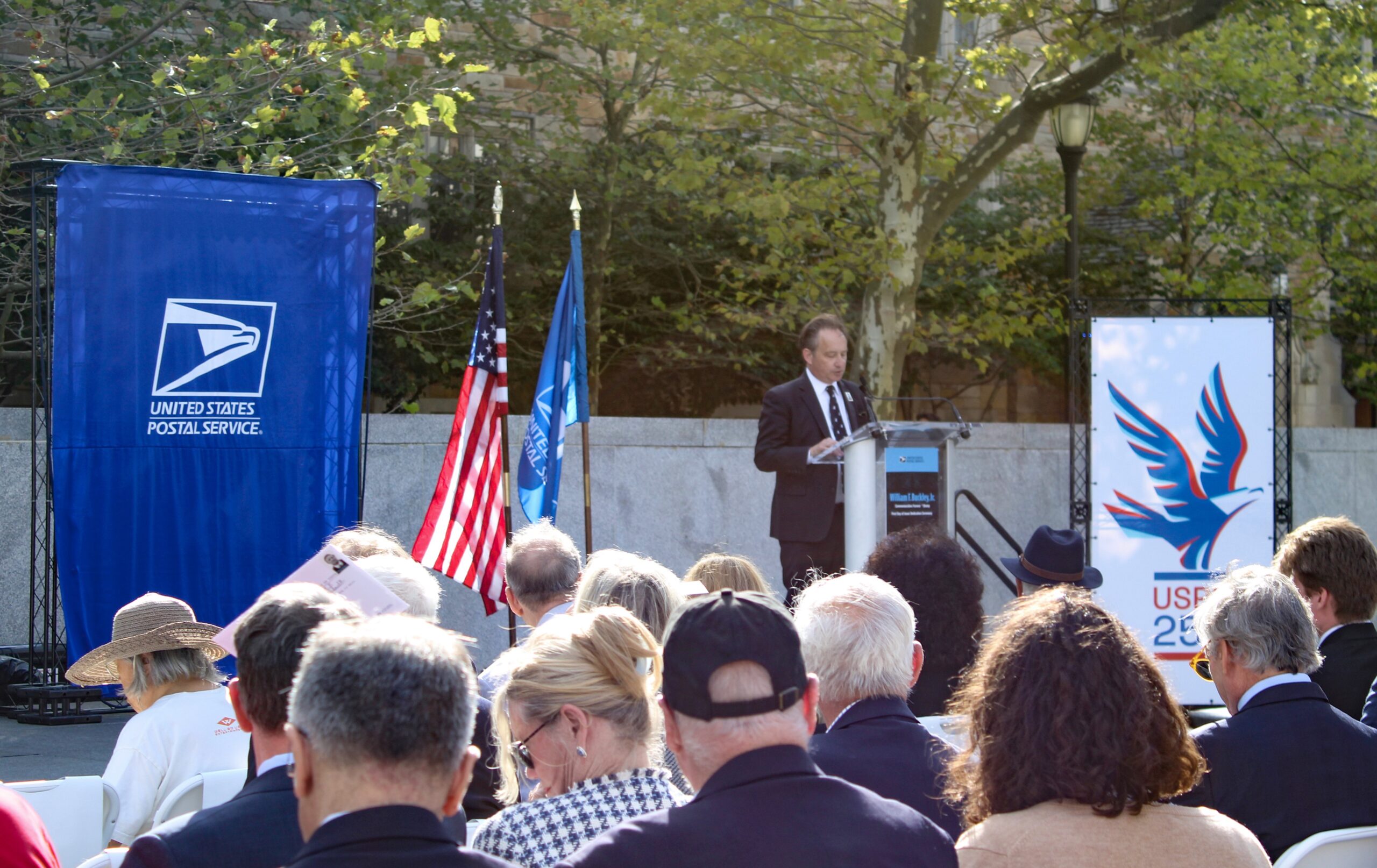Postal Service unveils new Buckley postage stamp
At a Tuesday ceremony on Beinecke Plaza, speakers highlighted the legacy of William F. Buckley Jr. ’50 — including criticism and love of Yale.

Ximena Solorzano, Head Photography Editor
Friends and family of prominent conservative figure William F. Buckley Jr. ’50 gathered Tuesday to celebrate the United States Postal Service’s newest stamp.
At a ceremony on Beinecke Plaza, USPS honored a newly commissioned stamp in Buckley’s image. The ceremony featured remarks from conservative thinker George Will, Buckley’s son Christopher Buckley and USPS Executive Vice President Isaac Cronkhite. Lauren Noble ’11, the founder and director of the Yale-adjacent Buckley Institute — a program promoting intellectual diversity — also gave remarks about her organization’s namesake.
“I think that the sort of legacy of intellectual engagement and intellectual inquiry which Buckley really represents, criticizing Yale but still loving it at the same time, is a message that we can all really take away,” Buckley Institute President William Barbee ’26 said in an interview.
Attendees came from up and down the East Coast, drawn to the event for reasons as varied as being fans of Buckley to being devoted stamp collectors.
The Postal Service has printed 12 million copies of the stamp, which was designed by illustrator Dale Stephanos. The image of Buckley depicted on the stamp is based on a 1960s photograph, according to the USPS website.
“An important goal of the United States Postal Service stamp program is to raise awareness and honor people, places and things that represent the very best of our nation. We believe that Mr. Buckley is so richly deserving of this honor,” Cronkhite said during the ceremony.
Peter Robinson, who emceed the ceremony, began with a quip on the aptness of a Buckley stamp, “because in all places and for all time, Americans will fix that stamp on the right.”
Prominent conservative commentator George Will credited Buckley as a founder of the “conversation that now is at a rolling boil” about the role that higher education institutions like Yale should play in society.
“Bill knew the universities had evolved 800 years through ecclesiastical and political thickets, and that what was a product of 800 years can be kicked away in a generation,” Will said.
Yale College Dean Pericles Lewis expressed pride about the endurance of Buckley’s legacy at Yale, recalling his leadership in campus organizations such as the Yale Political Union’s Conservative Party and the News, where he held the now-defunct role of chairman from 1949 to 1950.
“He focused above all on the challenge of transmitting the traditional values associated with college in the context of the newly emerging research university,” Lewis said of Buckley. “It is clear that he took full advantage of the opportunities provided by student debate and journalism at Yale to hone the skills that would make him such a formidable historical figure.”
Noble followed Lewis’ remarks, speaking about Buckley’s criticism of the University, which was captured in his book “God and Man at Yale.” According to Noble, the Buckley Institute shares its eponym’s commitment to a better Yale, which requires pointing out the institution’s flaws.
Noble and Christopher Buckley both referenced the 1950 Alumni Day Speech, which Buckley was slated to give. When the University asked Buckley to hold back his criticism of Yale in the speech, he refused to speak at all and instead published his critiques in “God and Man at Yale.” The book condemns Yale for straying from Christian ideals and instead promoting liberalism, collectivism and Keynesian ideology.
Robert O’Quinn, a retired economist who attended the ceremony, has been interested in Buckley’s work for 50 years, he said.
“Obviously he had a healthy criticism of Yale at the time of his graduation, and I think
universities need to re-examine their role,” O’Quinn said in an interview. “I think one of the things that Buckley believed in, and one of the things I believe in, is merit, and I don’t care what your background is.”
The Buckley Institute was founded in 2011.







